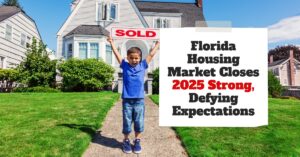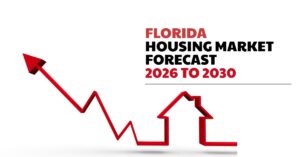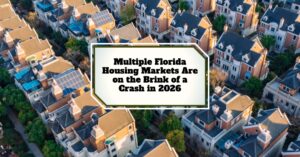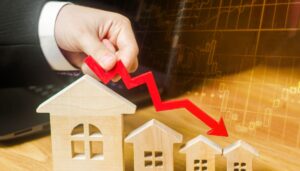You know, I’ve been following the Florida housing market for a while now, and I’ve got to say, 2025 really pulled a fast one on us. Just when it felt like things might be slowing down, the numbers for the end of the year came out, and they paint a surprisingly upbeat picture. If you’re thinking about buying or selling a home in the Sunshine State, there’s good news: Florida’s housing market ended 2025 on a decidedly positive note, with sales of single-family homes ticking up and inventory levels looking healthier, according to the latest data from Florida Realtors®.
Florida Housing Market Closes 2025 Strong, Defying Expectations
It wasn't just a little bump either; it was a significant turnaround from earlier in the year. This strength at year-end suggests a more stable and promising market than many might have predicted. It’s a welcome sign for both buyers and sellers alike.
A Mid-Year Turnaround: What Changed?
Dr. Brad O’Connor, the Chief Economist at Florida Realtors®, pointed out something crucial: the momentum really shifted midway through 2025. He explained that while the start of the year felt similar to the previous couple, with sales on the decline and more homes available, a change in key factors brought things back.
“While 2025 started much like 2024 and 2023, with sales falling and inventories rising, things changed midway through the year,” Dr. O’Connor noted. He highlighted two main drivers:
- A welcomed slowdown in homeowner insurance premium increases: This is huge for Florida. Insurance costs have been a major hurdle for many homeowners and potential buyers.
- Falling mortgage rates: By late 2025, mortgage rates had dropped by more than half a percentage point. This made borrowing money for a home more affordable, giving buyers a much-needed boost of confidence.
As a result of these shifts, Dr. O’Connor observed, “sales really responded here in the Sunshine State.” This isn't just about numbers on a page; it translates to real people being able to achieve their homeownership dreams.
The Year in Review: Key Figures and What They Mean
Let’s dive into the specifics released by Florida Realtors®. It’s not just about one month; it’s about the overall trend for the year.
Single-Family Homes: The Stars of the Show
When we look at the entire year of 2025, the numbers for existing single-family homes are quite encouraging.
- Closed Sales: Statewide, a total of 255,012 single-family homes changed hands. This marks a 0.9% increase compared to the end of 2024. While that might sound small, in a market this large, it signifies a solid gain and a deviation from the earlier downward trend.
- Pending Sales: Even more telling is what happened with new pending sales of single-family homes. At the end of 2025, these were up 1.9% from the previous year. This is a strong indicator for future closed sales. Dr. O’Connor emphasized this, stating, “December marked the fifth straight month where new pending sales of single-family homes increased on a year-over-year basis, with 5.4% more homes going under contract than in the same month the previous year.” This streak of positive pending sales is the longest we've seen since the peak pandemic boom of 2021.
In my experience, a consistent rise in pending sales is one of the best predictors of a healthy market. It means buyers are actively making offers and sellers are accepting them, creating a balanced and active environment.
Condo and Townhouse Market: A Different Story, but Still Improving
The market for existing condos and townhouses had a bit more of a bumpy ride in 2025, but even here, the end of the year brought some positive signs.
- Closed Sales: Statewide, 88,793 condo-townhouse units were sold. This was a 5.9% decrease compared to 2024 for the full year. This decline is partly attributed to regulations introduced starting in 2022 related to building safety and reserve requirements. While these are crucial for safety, they do add to the cost of ownership.
- Pending Sales: Similar to single-family homes, pending sales for condo-townhouse properties saw a dip, down 4.6% at the end of 2025 compared to the year before.
- End-of-Year Surge: However, Dr. O’Connor highlighted that “closed sales of condos and townhouses ended the year with a four-month positive growth streak that culminated in December, with closed condo-townhome sales up by 10.4% compared to the same month in 2024.” This late-year boost was a welcome sight, even if it couldn't entirely offset earlier declines for the year as a whole.
It’s important to remember that the condo and townhouse market often reacts differently to various economic pressures and regulations. The increased focus on safety is a necessary step, and as the market adjusts to these new standards, we'll likely see continued evolution here.
Stabilizing Prices: A Healthier Playing Field?
One of the most talked-about aspects of any housing market is price. For much of the recent past, prices have been on a relentless upward march. However, 2025 showed signs of stabilization, which I see as a positive development for long-term market health.
- Single-Family Median Price: The statewide median sales price for existing single-family homes at the end of 2025 was $413,990. This was a slight decrease of 1.4% from the previous year. When I see prices stabilizing or slightly decreasing, it doesn't necessarily mean the market is crashing. Instead, it often indicates a return to more sustainable appreciation that aligns with economic fundamentals.
- Condo-Townhouse Median Price: For condo-townhouse properties, the statewide median price was $310,000, down 4.7% at year-end 2024. Again, this points to a cooling off from rapid price hikes, making these properties potentially more accessible.
It’s worth defining what the “median price” means: it’s the midpoint. Half of the homes sold for more than this price, and half sold for less. This gives us a good central point for understanding market value.
Looking specifically at December 2025, the median price for single-family homes actually held steady at $415,000, the same as the previous year. Condo-townhouse prices in December were $310,000, down 1.6% year-over-year.
Inventory Levels: A Return to Normalcy?
Inventory is the key to understanding buyer demand versus seller supply. For a while, Florida, like many places, struggled with very low housing inventory. This created a seller’s market where buyers often had to act fast and pay top dollar. The data for 2025 suggests a move toward a more balanced situation.
- Single-Family Homes: At the end of 2025, inventory for single-family homes stood at a 4.6-months’ supply. This is a significant improvement and aligns more with what we'd consider normal seasonal patterns. A 4 to 6-month supply is often seen as a balanced market.
- Condo-Townhouse Properties: The condo-townhouse market showed a larger supply, at 8.8-months’ supply. While this is on the higher side, it reflects the slower sales pace in this segment and contributes to pricing stability.
This increase in available homes means buyers have more options and less pressure, leading to more thoughtful decision-making. For sellers, it means their homes might stay on the market a little longer, but they can still expect steady demand if their pricing is right.
Quarterly Insights: A Closer Look at Q4 2025
The numbers for the fourth quarter of 2025 (October, November, December) reinforce the positive year-end trend.
Single-Family Homes in Q4:
- Closed Sales: 60,872 existing single-family homes sold, a solid 7.7% increase compared to Q4 2024.
- Median Price: The median sales price for the quarter was $413,000, showing a minimal decrease of 0.5% from Q4 2024.
Condo-Townhouses in Q4:
- Closed Sales: 21,233 units sold, up by 7.9% from the same quarter in 2024.
- Median Price: The median price for the quarter was $300,000, down 4.8% over the previous year.
These quarterly figures are crucial because they often reflect the most recent market conditions and sentiments, and they clearly show the upward momentum carrying Florida’s housing market forward.
The Bigger Picture: Dollar Volume and Inflation
While unit sales and median prices are important, the total dollar volume of sales gives us another angle.
According to Dr. O’Connor, the annual dollar volume for single-family sales in 2025 increased by 2% to $154.6 billion. However, he wisely notes that, factoring in inflation (which was above 2% in 2025), the real dollar volume actually saw a slight decline of less than 1%. This still places 2025’s dollar volume on par with a good number of previous years, showing resilience.
The condo and townhouse segment saw a larger hit to its dollar volume. Due to fewer sales and slightly lower prices, the annual dollar volume was down 8.5% to $40.6 billion, and down 10.5% when inflation is considered. This reflects the challenges in that particular market segment throughout the year.
Why This Matters for You
As 2026 Florida Realtors® President Chuck Bonfiglio put it, “2025 brought Florida a stronger, more sustainable housing market – and that’s a win for consumers.”
What does this mean for you, whether you’re looking to buy or sell?
- Buyers: You have more homes to choose from, and with stabilizing prices and slightly lower mortgage rates, it’s a more favorable time to enter the market. You can take your time, explore your options, and negotiate more effectively.
- Sellers: While homes might not fly off the market as quickly as they did during the peak boom, there is steady demand. With a balanced inventory, pricing your home correctly is key.
Bonfiglio also stresses the importance of working with a professional: “Now and throughout the year, working with a Realtor® across Florida offers the local insight and guidance that can help you turn today’s market into a real opportunity for your future.” I couldn’t agree more. Real estate is complex, and having an expert by your side can make all the difference.
In conclusion, Florida’s housing market defied expectations by ending 2025 with renewed strength. The combination of stabilizing prices, healthier inventory levels, and a mid-year surge driven by falling mortgage rates and easing insurance cost growth created a more sustainable and positive environment for everyone involved. It's a sign that the market is maturing and finding a healthy rhythm after years of rapid fluctuation.
Florida’s Market Is Shifting—Investors Are Staying Ahead
From Cape Coral to Jacksonville, Florida’s housing market is evolving—but turnkey investors are locking in cash-flowing properties while prices and rents remain favorable.
Norada Real Estate helps you navigate Florida’s changing landscape with fully managed rental properties in high-demand cities—so you can build passive income and long-term equity with confidence.
🔥 NEW FLORIDA LISTINGS JUST ADDED! 🔥
Talk to a Norada investment counselor today (No Obligation):
(800) 611-3060
Want to Know More About the Florida Housing Market?
Explore these related articles for even more insights:
- Florida Housing Market Predictions for 2030: A Five‑Year Forecast
- Best Places in Florida to Invest in Real Estate in 2026
- Florida Housing Market: Home Price Forecast for 2026
- Multiple Florida Housing Markets Are on the Brink of a Crash in 2026
- Florida Condos Hit Hardest Since the Great Recession as Prices Tumble
- Florida Leads Among the Fastest Cooling Housing Markets of 2025
- Florida Housing Market Predictions Over the Next One Year
- Florida Housing Market Trends: 4 Cities Turn Buyer-Friendly in 2025
- Florida Housing Market Sees a Major Shift With a Jump in Pending Sales
- Florida Housing Prices Drop for the Fifth Consecutive Month in 2025
- Is the Florida Housing Market on the Edge of a Crash or Downturn?
- 24 Florida Housing Markets Could See Home Prices Drop by Early 2026
- Tax Relief Proposed as Florida Housing Market Faces Deepening Crisis
- Florida Housing Market: Record Supply Expected to Favor Buyers in 2025
- Florida Housing Market Forecast for Next 2 Years: 2025-2026
- Florida Housing Market: Predictions for Next 5 Years (2025-2030)











